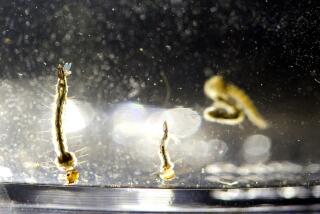New Developments May Advance Biopesticide Use
- Share via
SAN DIEGO — Biopesticides, which use natural substances such as bacteria to fight insect and weed destruction of crops, have met only limited success with farmers so far, making few inroads on the estimated $15-billion worldwide pesticide market still dominated by such chemical giants as Du Pont and Monsanto.
Biopesticides have proven difficult to produce and apply, too delicate and short-lived in the field because of vulnerability to ultraviolet rays and to plant acidity, and not general enough to satisfy farmers who want pesticides to eradicate several pests in one application.
Recent advances, however, raise hopes for the future, particularly for pesticides derived from bacillus thuringiensis, a bacteria that occurs in more than 4,000 forms in nature. BT, as the bacteria is referred to, produces a protein toxin that kills certain insects that ingest it. The toxin expands in the pests’ digestive systems, thereby robbing them of their appetite.
At the forefront of BT product development is Mycogen Corp. of San Diego, a company formed in 1983 by former chemical and pharmaceutical company executives. Mycogen anticipates that it will receive Environmental Protection Agency approval in April to begin selling its M-One Colorado potato beetle biopesticide.
Spurring the development by Mycogen and others are refinements in the fermentation techniques used to grow huge quantities of bacteria, making the production process commercially viable. Scientists have also discovered that toxins in BT kill a growing list of pests including caterpillars, beetles, weevils, mosquitoes and moths, making more general applications possible.
The stepped-up research is being further spurred by the increasingly prohibitive costs of developing synthetic chemical pesticides. Du Pont estimates that it takes $50 million and six to eight years of tests to get a pesticide approved by the EPA.
Streamlined EPA standards designed to encourage the development of biopesticides, by contrast, enable manufacturers to spend as little as $500,000 and two years getting a new product approved.
Farmers spend $120 million worldwide annually on pesticides to kill the Colorado potato beetle, and Mycogen hopes to capture a significant percentage of that market.
Even more important for Mycogen’s long-term prospects is its discovery of a protein “delivery system” for biopesticides, also derived from BT, that increases biopesticides’ persistence in the field by up to five times the normal duration.
The product, called M-Cap, was described by Mycogen executives as a sort of naturally produced “gelatin capsule” that shields the BT toxin from ultraviolet rays and from plant acidity, two elements that break down biopesticide effectiveness and which continue to limit biopesticides’ appeal to farmers.
Several questions remain to be answered about Mycogen’s future, however. One involves the company’s position with patents. Although the BT microbe contained in M-One is not patentable because it occurs in nature, the company has applied for a patent on the grounds that the application of the microbe is “novel,” Vice President Andrew Barnes said.
Even if the U.S. Patent Office accepts that position, Mycogen faces some competition for the patent from a German researcher who has made a similar application. Roman Saliwanchik, Mycogen’s Gainesville, Fla-based patent attorney, said the company does not expect the patent ruling to be settled for two years.
Denise M. Gilbert, a biotechnology analyst with Montgomery Securities in San Francisco, said a patent for M-One is not nearly as crucial for Mycogen as its application for a patent on the M-Cap delivery system. Mycogen is the only company developing such a delivery system for biopesticides, Gilbert said.
Mycogen also faces intensifying competition from several companies, ranging from start-ups such as Ecogen of Langhorne, Pa., to giants such as Abbott Laboratories and Du Pont, each of which are developing BT-related products.
Ecogen’s first BT-based product, expected on the market by 1989, will be a Colorado potato beetle biopesticide that will compete with Mycogen’s M-One. But Ecogen President Jack Davies said the key to the biopesticide market in the future lies with companies that use gene-splicing methods to strengthen the durability of BT and other microbes in the field.
“I see (BT-based biopesticides) becoming a significant part of the industry in the next 10 years,” said John Kane, president of Abbott Laboratories’ agricultural and chemical products division. “There is a broader range of products, cost competitiveness and the regulatory route is less trouble.”
More to Read
Inside the business of entertainment
The Wide Shot brings you news, analysis and insights on everything from streaming wars to production — and what it all means for the future.
You may occasionally receive promotional content from the Los Angeles Times.










